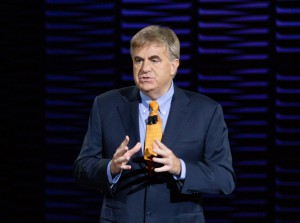
Toyota's U.S. sales chief Bob Carter expressed concern about the potential impact of actions by the Trump administration could have on sales this year.
U.S. auto sales suffered a severe chill over the winter. Demand was widely expected to slip slightly after posting an unexpected increase in 2019, but the market has been surprisingly weak and many of the industry officials gathered for this week’s media preview at the New York International Auto Show fear the situation could get worse.
In particular, there was a clear sense of concern that President Donald Trump could be “pulling the pin out of the grenade,” as Bob Carter, head of U.S. sales for Toyota put it, escalating the various trade wars to the point that it could send American car sales into a tailspin.
The harsh weather that swept through much of the country in January and February clearly took some of the blame for the way demand tumbled during the first quarter. But even a climactic reprieve in March did little to improve the situation, and sales for the first three months of the year were off by 4%. Only four brands finished the quarter in the black – and even then, only on the retail side.
“We have to face the fact that we’re up on a plateau, so a downturn is not surprising,” said Joe Phillippi, head of AutoTrends Consulting, echoing forecasts by experts like LMC Automotive and IHS Markit, that see 2019 coming in anywhere from 16.6 million to 16.8 million.
(Hyundai Venue completes Korean carmaker’s SUV roll-out. Click Here for the story.)
The 2019 NYIAS saw more than two dozen new products debut, with the vast majority of them targeting the utility vehicle segment, the only area of the American market showing real life. Sales of sedans, coupes and hatchbacks continue to lose momentum.

Porsche North America CEO Klaus Zellmer said the company expects to set a new U.S. sales record this year.
Traditional passenger cars weren’t entirely absent from the floor of the Jacob Javits Convention Center, however. Even while introducing the Venue, its seventh SUV – more than double what it offered three years ago – Hyundai also rolled out a new version of its midsize Sonata sedan, and Toyota showed off a new version of its Yaris hatchback.
Industry officials like Jack Hollis, head of the Toyota brand, continue to hope that there could be an upturn, and they point to the flood of new vehicles hitting the market, the traditional automotive mantra being that nothing helps brings shoppers back into showrooms more effectively than new sheet metal.
At least some officials like Jack Hollis, head of the Toyota brand, continue to hope that there could be an upturn, and they point to the flood of new vehicles hitting the market, the traditional automotive mantra being that nothing helps brings shoppers back into showrooms more effectively than new sheet metal.
“I truly believe we’ll see a stronger market than what was expected at the beginning of the year,” said Hollis.
But even he admitted concern that there are a number of issues outside the industry’s control that could make the situation even worse.
His boss, Bob Carter, pointed to some of the industry’s worst fears during a speech in the Big Apple, warning that the 25% tariffs on imported cars and car parts that Trump is now considering could prove disastrous.
(Click Here for details about Porsche’s plans to set a new U.S. sales record.)
The president has already hammered the industry by enacting a 25% surcharge on imported aluminum and steel, General Motors and Ford each reporting a $1 billion hit to their earnings last year. But the new tariff threat could be far more devastating, to hear industry leaders speak. Porsche’s U.S. President Klaus Zellmer warned that his company’s sales could tumble by as much as 20%. And it’s not just importers who would be hurt.
Toyota currently assembles in North America more than 80% of the vehicles it sells in the U.S. But the tariffs being proposed could raise the price of a Kentucky-made Camry by $4,000, he said, because of the imported parts it uses. And domestic makers like GM, Ford and Fiat Chrysler wouldn’t be exempt.
As many as 77,000 jobs at auto industry retail and service outlets across the country could be quickly lost if the tariffs are enacted, according to an estimate by Center For Automotive Research in Ann Arbor, Michigan. But others forecast that, if tariffs cause sales to tumble by more than 1 million, tens, and even hundreds of thousands of manufacturing jobs could also be impacted.
Even if Trump decides to avoid new tariffs, “At best, stagnation is expected for 2019,” said Steve Rich, a vice president with auto supplier Autoneum, during the NYIAS opening ceremonies.
And the auto industry itself will have to accept some of the blame, said analyst Phillippi.
Part of the problem, he said, was the continuing rise in vehicle pricing. The average new car, truck or crossover now costs about $35,000, according to industry data, and the numbers continue to rise. Brian Smith, the chief operating officer of Hyundai Motor America, noted that a sizable share of the 40 million Americans who bought used vehicles in 2018 were simply priced out of the new vehicle market.
(To see more about Toyota’s new and improved Highlander SUV, Click Here.)
If the upward pricing trend continues, the pool of potential buyers could continue to grow smaller.
